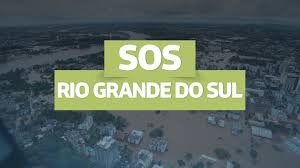The role of psychiatry in areas affected by natural disasters
revised and expanded translation of: https://doi.org/10.47626/1516-4446-2024-3752
DOI:
https://doi.org/10.25118/2763-9037.2024.v14.1296Keywords:
anxiety, crisis intervention, depression, flooding, mental health, natural disasters, post-traumatic stress disorder, psychiatric intervention, psychological morbidityAbstract
Since late April 2024, the state of Rio Grande do Sul (RS), Brazil, has been facing the most significant climatic tragedy in its history. An initial assessment by the RS government's crisis management office indicates that the rains will cause damages potentially totaling R$ 19 billion in the affected regions. The heavy rains have affected 450 municipalities, with an estimated number of displaced individuals already surpassing half a million, with around 80,000 people in shelters. Direct damages caused by floods and landslides affect 2.1 million people. Traumatic events of such magnitude often impact mental health and trigger negative psychological responses in both direct victims and affected communities, as well as in professionals involved in rescue operations, logistical support, and humanitarian assistance. These effects include a significant increase in the incidence of PTSD, anxiety, and depression. In this context, Psychiatry emerges as a medical discipline dedicated to comprehensive mental health care, offering its expertise in immediate emotional support, psychological stabilization, risk screening, therapeutic interventions, and long-term prevention strategies to alleviate suffering and promote the recovery of victims.
Downloads
Metrics
References
Instituto Nacional de Meteorologia. Centro Virtual para Avisos de Eventos Meteorológicos Severos – RS. 2024, 26 de abril. [Internet]. Acesso em 11/05/2024. Disponível em: https://alertas2.inmet.gov.br/47195#:~:text=INMET%20%3A%3A%20Alert%2DAS&text=Riscos%20Potenciais%3A,)%2C%20e%20queda%20de%20granizo
Instituto Nacional de Meteorologia. Centro Virtual para Avisos de Eventos Meteorológicos Severos - RS. 2024, 29 de abril. [Internet]. Acesso em 11/05/2024. Disponível em: https://alertas2.inmet.gov.br/47227#:~:text=INMET%20publica%20aviso%20iniciando%20em,de%20%C3%A1rvores%20e%20de%20alagamentos
Plano Rio Grande. Projetos Estruturantes, versão 1. Acesso em 08/07/2024. Disponível em: https://admin.reconstrucao.rs.gov.br/upload/arquivos/202406/26084455-2024-06-24-doc-plano-rio-grande-v3.pdf
Norris FH, Murphy AD, Baker CK, Perilla JL, Gutierrez Rodriguez F, Gutierrez Rodriguez J. Epidemiology of Trauma and Posttraumatic Stress Disorder in Mexico. Journal of Abnormal Psychology, 2003; 112(4):646–656. https://doi.org/10.1037/0021-843X.112.4.646 DOI: https://doi.org/10.1037/0021-843X.112.4.646
Neria Y, Nandi A, Galea S. Post-traumatic stress disorder following disasters: a systematic review. Psychological Medicine, 2008;38(4):467–480. https://doi.org/10.1017/S0033291707001353 DOI: https://doi.org/10.1017/S0033291707001353
Kessler RC, Galea S, Gruber MJ, Sampson NA, Ursano RJ, Wessely S, Fullerton CS. Trends in Mental Illness and Suicidality After Hurricane Katrina. Molecular Psychiatry, 2008;13(4):374–384. https://doi.org/10.1038/sj.mp.4002119 DOI: https://doi.org/10.1038/sj.mp.4002119
Karam EG, Friedman MJ, Hill ED, Kessler RC, McLaughlin KA, Petukhova M, Sampson L, Shahly V, Angermeyer MC, Bromet E., de Girolamo G, de Graaf R, Demyttenaere K, Ferry F, Florescu S, Haro JM, He Y, Karam AN, Kawakami N, Kovess-Masfety V, Medina-Mora ME, Browne MAO, Posada-Villa JA, Shalev AY, Stein DJ, MC Viana, Zarkov Z, Koenen KC. Cumulative traumas and risk thresholds: 12-Month PTSD in the World Mental Health (WMH) surveys. Depression and Anxiety, 2014; 31(2):130–142. https://doi.org/10.1002/da.22169 DOI: https://doi.org/10.1002/da.22169
Santos-Lozada AR, Howard JT. Use of Suicide Risk Assessment and Management Tools by Emergency Physicians in Puerto Rico. Disaster Medicine and Public Health Preparedness, 2019;13(1):51–56.
Mulchandani R, Armstrong B, Beck CR, Waite TD, Amlôt R, Kovats S, Leonardi G, Rubin GJ, Oliver I. The English National Cohort Study of Flooding & Health: psychological morbidity at three years of follow up. BMC Public Health. 2020;20(1):321. https://doi.org/10.1186/s12889-020-8424-3 DOI: https://doi.org/10.1186/s12889-020-8424-3
The English National Study of Flooding and Health: Summary of the evidence generated to date [Internet]. Acesso em: 29/05/2024. Disponível em: https://assets.publishing.service.gov.uk/media/5e6bb75fd3bf7f2695546ba8/SummaryoffindingsNSFHJanuary2020FinalforDsPH3.pdf
Koenen KC, Ratanatharathorn A, Ng L, McLaughlin KA, Bromet EJ, Stein DJ, Karam EG, Meron Ruscio A, Benjet C, Scott K, Atwoli L, Petukhova M, Lim CCW, Aguilar-Gaxiola S, Al-Hamzawi A, Alonso J, Bunting B, Ciutan M, de Girolamo G, Degenhardt L, Gureje O, Haro JM, Huang Y, Kawakami N, Lee S, Navarro-Mateu F, B.-E. Pennell B-E, Piazza M, Sampson N, ten Have M, Torres Y, Viana MC, Williams D, Xavier M, Kessler RC. Posttraumatic stress disorder in the World Mental Health Surveys. Psychological Medicine, 2017; 47(13):2260–2274. https://doi.org/10.1017/S0033291717000708 DOI: https://doi.org/10.1017/S0033291717000708
Hobfoll SE, Watson P, Bell CC, Bryant RA, Brymer MJ, Friedman MJ, Friedman M, Gersons BPR, de Jong JTVM, Layne CM, Maguen S, Neria Y, Norwood AE, Pynoos RS, Reissman D, Ruzek JI, Shalev AY, Solomon Z, Steinberg AM, Ursano RJ. Five essential elements of immediate and mid-term mass trauma intervention: Empirical evidence. Psychiatry, 2020; 83(3):237–245. https://doi.org/10.1521/psyc.2007.70.4.283 DOI: https://doi.org/10.1521/psyc.2007.70.4.283

Published
How to Cite
Conference Proceedings Volume
Section
License
Copyright (c) 2024 César Augusto Trinta Weber, Antônio Geraldo da Silva

This work is licensed under a Creative Commons Attribution-NonCommercial 4.0 International License.
Debates em Psiquiatria allows the author (s) to keep their copyrights unrestricted. Allows the author (s) to retain their publication rights without restriction. Authors should ensure that the article is an original work without fabrication, fraud or plagiarism; does not infringe any copyright or right of ownership of any third party. Authors should also ensure that each one complies with the authorship requirements as recommended by the ICMJE and understand that if the article or part of it is flawed or fraudulent, each author shares responsibility.
Attribution-NonCommercial 4.0 International (CC BY-NC 4.0) - Debates em Psiquiatria is governed by the licencse CC-By-NC
You are free to:
- Share — copy and redistribute the material in any medium or format
- Adapt — remix, transform, and build upon the material
The licensor cannot revoke these freedoms as long as you follow the license terms. Under the following terms:
- Attribution — You must give appropriate credit, provide a link to the license, and indicate if changes were made. You may do so in any reasonable manner, but not in any way that suggests the licensor endorses you or your use.
- NonCommercial — You may not use the material for commercial purposes.
No additional restrictions — You may not apply legal terms or technological measures that legally restrict others from doing anything the license permits.





























